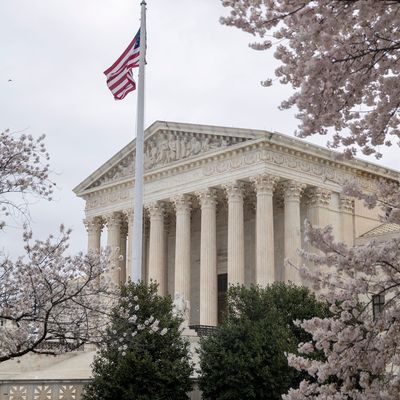
This week’s Supreme Court orders list again featured a dog that noisily did not bark: abortion. There was no action on Dobbs v. Jackson Women’s Health Organization, which concerns whether a Mississippi ban on abortions after 15 weeks of pregnancy is unconstitutional. Mississippi petitioned for SCOTUS review last June, of course; the whole point of the state’s provocative law was to invite the Court to reverse or significantly modify Roe v. Wade and Planned Parenthood v. Casey, the landmark decisions establishing and affirming a constitutional right to abortion.
The Dobbs case has repeatedly been on the list for discussion at the Court’s conferences. In the meantime, a 5-4 majority of the Court struck down a Louisiana law aimed at shutting down abortion clinics, which was apparently too close for the comfort of Chief Justice John Roberts to a Texas law the Court had struck down earlier in Whole Woman’s Health v. Hellerstedt. But then Justice Ruth Bader Ginsburg died, and in October, Trump nominee Amy Coney Barrett was confirmed and joined the Court, expanding the conservative majority to six. Subsequently, just before Donald Trump left office, a 6-3 majority of the Court put aside a lower-court ruling freezing an FDA order against mail distribution of a pill often used to induce abortions, professing to do so on procedural grounds. So the direction of the Court on abortion law remains, for the moment, a mystery while a decision on a review of Dobbs is delayed again and again.
There are multiple theories about what’s going on. It takes just four justices to agree to review a case. Quite possibly, there are five or six prepared to begin unraveling the Court’s abortion precedents but no consensus of four on where to start or how quickly to proceed. Justices Clarence Thomas, Samuel Alito, and Neil Gorsuch are thought to be the Court members most likely to favor direct reviews of Roe and Casey. The chief justice is clearly disposed to be cautious in this area, and Justice Brett Kavanaugh, perhaps because of the many assurances he was forced to make about respect for precedents during his confirmation hearings, may be similarly inclined. Barrett, though widely presumed to oppose a constitutional right to choose, remains a mystery in terms of her strategic thinking on the subject.
The most likely path for an anti-abortion majority is a gradual erosion of Roe and Casey, rather than an abrupt reversal, perhaps through a green light to states that want to regulate providers out of existence. But the Court would need restrictions different from those in the Texas and Louisiana laws it has so recently invalidated (though five justices dissented from the majority in one case or the other). So maybe Roberts and Kavanaugh are waiting for the “right” case, and the other four conservative justices don’t want to take up a case unless an anti-abortion majority is certain.
More immediately, it’s possible that a majority has decided to decline a review of the Mississippi case but that a negative order is being delayed while justices who are eager to approve the Mississippi law write long, passionate dissents. Nobody really knows.
Although everyone on both sides of the abortion barricades is nervous about what’s happening within the Court, curiously enough, anti-abortion activists seem to be those who are most fearful right now, as the Los Angeles Times recently reported:
Conservative legal analyst Ed Whelan called the Dobbs case “the best opportunity the Supreme Court will ever have to overturn Roe.” The case “provides an excellent vehicle for overruling” the right to abortion and returning the issue to the state legislatures, he wrote in November. “Indeed, it is unlikely that there will ever be a more opportune moment” …
In late January, Whelan said he was surprised and dismayed the court had not granted review yet, adding he would be “deeply disappointed” if the new conservative justices “failed to provide the needed votes.”
Indeed, you can begin to sense a revival of a very old tradition in the anti-abortion movement of fearing betrayal by the Supreme Court appointees of Republican presidents. After all, the author of Roe v. Wade was Nixon appointee Harry Blackmun, who was supported by two other Nixon and two Eisenhower justices. And all five of the pro-choice majority in Planned Parenthood v. Casey were placed on the Court by putatively anti-abortion Republican presidents. As New York Times columnist Ross Douthat reports, “pro-life skeptics of the conservative legal establishment are already citing Dobbs to suggest that the just-overturn-Roe strategy might be poised to fail again.” That would certainly be a shocking repudiation of the efforts made under Trump to create, via careful vetting of Court nominees, a safeguard against stealth supporters of abortion rights.
But as Douthat also observes, at this potentially crucial moment the anti-abortion movement is itself divided: There is sudden activist enthusiasm for the long-standing but previously marginal “personhood” crusade, which, instead of reversing Roe, would stand it on its head by establishing federal constitutional protections for fetal rights regardless of what state governments choose to do. There’s not much evidence of judicial support for that radical notion. But the long game that any incremental strategy for unraveling 48 years of precedent may involve could be too much for impatient culture warriors who swallowed misgivings about the heathenish 45th president because he promised to deliver a Supreme Court that would decisively turn back the clock. And among pro-choice advocates who are holding their breath each time a Supreme Court order list is released, the long game means implementing tactics like encouraging liberal justice Stephen Breyer to retire so a younger successor can be confirmed while Democrats control both the White House and the Senate. These are nerve-racking times indeed for Court watchers who support or oppose women’s reproductive rights.






























